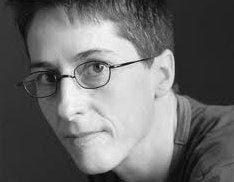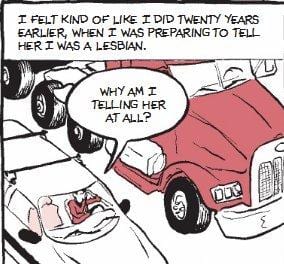
"I feel like people who are driven to tell stories are just trying to get something they're missing," says Bechdel.
For Alison Bechdel, making graphic memoirs is a journey to create meaning. “I love trying to make stories out of the raw material of everyday life, which is basically chaos,” she says. “I don’t believe, intellectually, that my life has meaning, but I love trying to find meaning within it.”
This introspection defines her career. For 25 years Bechdel looked at queer issues in her landmark comic strip Dykes to Watch Out For (where the Bechdel Test first appeared) and then earned a big breakthrough with her 2006 memoir, Fun Home. That book, named the best of the year by Time magazine, was equally autobiography and a biography of her father, Bruce, a closeted gay man who committed suicide months after Alison came out.
While Bechdel’s mother, Helen, is a background player in Fun Home‘s family drama, she takes centre stage in Bechdel’s new book, Are You My Mother? Through the lens of Donald Winnicott’s psychoanalytical theories, the memoir unpacks Bechdel’s relationship with her mother and what that means for Bechdel’s sense of self. She acknowledges that this book can be difficult for a family, but that it’s necessary for the individual. “I know she’s not happy with this kind of work — it’s painful for her to have this part of her life exposed. But at the same time, she has a certain respect for the creative process. She understands I need to do this.”
Helen is portrayed as somewhat cold and distant in the book, a figure more at home on a community theatre stage than as a nurturing mother. But there are incidents Alison can connect to, like a rare shared viewing of a TV show or help with her childhood journal. In other words, art mediates Bechdel’s relationship with her mother.
But not all art is universal. In a moving three-page passage, Bechdel calls her mother to ask for money when she starts to create Dykes to Watch Out For. Despite her disapproval — she’s worried about what people will think — her mother sends the money and supports her daughter financially for nine months. Bechdel cries, her ability to speak limited, but she understands: “Whatever I wanted from my mother was simply not there to be had. It was not her fault.”
While Helen didn’t understand the content of the comics, she recognized the need to have an emotional outlet to tell one’s story, something Winnicott refers to as a “playspace.” If Helen couldn’t provide that emotional space, she could provide it materially to foster her daughter’s growth.
“I feel like people who are driven to tell stories are just trying to get something they’re missing,” Bechdel says. She adds that this process is more about the journey in finding meaning than the result. If the gaps in understanding are the spaces for meaning to be formed, then this is what excites Bechdel.
“Telling these stories about both of my parents has involved a process of transformation, in that Joseph Campbell sense. That’s something you really can’t control, but you can submit to.”
At the end of Are You My Mother? Alison plays a game with Helen in which they pretend she is a disabled child. It’s one of those rare instances in which they connect, but Alison chooses to walk away. Bechdel writes that in the absence of certain support, “[Helen] has given me the way out.” And with that, Alison exits stage right to create stories and meaning for herself.
Alison Bechdel
Presentation and book signing
Sun, Dec 2, 5:30pm-7:30pm
Presented by The Beguiling Comic store
The Centre for Social Innovation, Annex Building
720 Bathurst Street (Just south of The Beguiling)

 Why you can trust Xtra
Why you can trust Xtra


